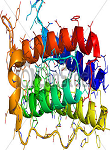|
|
|
EDITORIAL: The Transformative Age of Leptin in Diabetes Treatment
|
|
|
|
|
|
|
|
|
|

|
|
|
|
Ashley M. Fenn, PhD
|
|
|
|
Harvard Medical School
|
|
Center for Systems Biology, Massachusetts General Hospital, HMS, Boston, MA 02114, USA
|
|
afenn@mgh.harvard.edu
|
|
|
|
|
|
|
|
|
|

|
|
Type I diabetes is characterized by the gradual loss of β cells in the pancreas leading to insulin deficiency, hyperglycemia, and if left untreated, death. Since the 1920’s Type I diabetes has been treated with multiple daily injections of insulin in an attempt to restore glucose metabolism and stave off ketoacidosis - the life-threatening consequence of chronic hyperglycemia. While insulin injections have allowed millions of people to successfully live with Type I diabetes, it is by no means a perfect treatment. Multiple daily injections and the short half-life of insulin combine to cause daily bouts of hypoglycemia and hyperglycemia, which can cause multiple detrimental sequelae including microvascular damage, nerve damage, fat buildup/obesity, and cardiovascular disease (Smith-Marsh and Zeller 2017). Thus, Type I diabetics have been waiting for a new and better therapy to be developed.
|
|
|
|
|
|
|
|

|
|